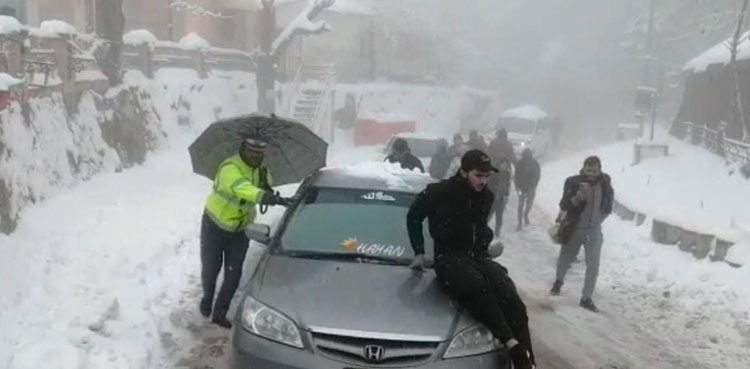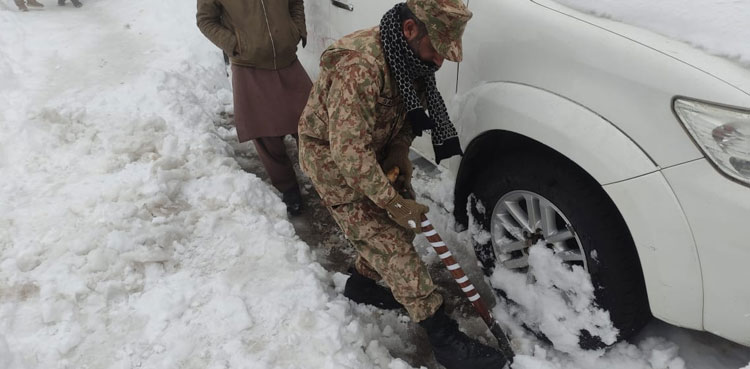OPINION: Deadly weather brings Murree tragedy
- By Malik Nasir Mahmood Aslam -
- Jan 15, 2022

A weekend retreat turned into disaster when more than 23 people lost their lives in Murree when it became snowbound hell after being hit by a severe snowstorm.
The tragedy occurred when an enormous traffic jam caused by tens of thousands of visitors thronging the hill station badly mauled the visitors with at least six people reported frozen to death in their cars while it was not immediately clear if others had died from asphyxiation after inhaling fumes in the snowdrift.
The military had mobilised to clear roads and rescued thousands still trapped near Murree and situation is gradually returning to normalcy.
Videos shared on social media showed cars packed bumper-to-bumper with three-foot piles of snow on their roofs. The tragedy occurred when despite warnings for almost all of the past week of heavy rains lashing Islamabad and Rawalpindi while Murree and nearby hill stations in the Galiyat area receiving intermittent but heavy snowfall.
Notwithstanding these forecasts a record number of people traveled northbound to experience the snowfall as the figures quoted now reveal over more than 155,000 vehicles entering Murree last week out of which 135,000 returned safely but the rest became stranded.

Despite a severe weather warning the local managements of Rawalpindi and Islamabad miserably failed to adopt safety measures to prevent hundreds of thousands of visitors from entering Murree in hazardous rainfall and blizzard, resulting in the tragedy.
On 5 January, the Met Office had issued a specific warning of impending calamitous weather. The advisory warned that heavy rain with heavy snowfall over the hills, isolated heavy to very heavy is expected in all hilly areas including Murree, Galiyat, Neelum Valley, Naran, Kagan, etc, on 7 January.
The rush of visitors in these conditions was a disaster waiting to happen. The blizzard resulted in the felling of 16 trees and 60 electric poles on the main arteries of the city which blocked the moving traffic, stranding tourists. It must be kept in view that hill stations have limited capacity, with Murree only being able to accommodate 4,000 cars at a given time but the tremendous onrush of thousands of vehicles disrupted everything.
Moreover, in light of the dire weather forecast, the authorities should have issued travel alerts to the public, warning families to desist from making weekend travel plans to the hill station.
It was reported that huge pile ups of cars and vans could be seen on the snowbound roads with nowhere ahead to go or to scramble for safety as women and children remained crammed into vehicles in subzero temperatures. Many of those visitors were reportedly weeping for help, which was not there.
It was heartbreaking to see so many children and women caught up in the hazard.
They were hungry, tired and many had no fuel in the cars. Desperate for safety, many motorists had abandoned their cars in the middle of roads, which also added to the problem of clearing the roads.
However, traffic police sources said the National Highways and Motorways officials were slow in removing snow from the roads.
The most troubling aspect of the tragedy was people in distress were fleeced by residents of Murree as the prices for everything started skyrocketing as a state of panic spread in Murree.
People now wanted to return home but found themselves tied due to snowfall and road blockages. In all of this, hotels raised their per night fee up to Rs.50,000. Locals who were previously clearing the car of snow started charging Rs.10,000 to Rs.20,000 for doing so.
Moreover, the prices of food and beverage also increased many folds while people had no option but to purchase. Many tourists complained on social media that hoteliers had pushed up prices to capitalise on stranded customers, prompting them to sleep in cars.
Many Pakistanis complained on social media that Murree hoteliers and guest-house owners had compounded the problem by price gouging, prompting stranded people to spend the night in their cars rather than pay for a room.
It was stated that things would have been different if local people and hotels were cooperative but the reputation and conduct of the local people of Murree are very bad in this respect.
The tragedy was massive crisis management cells have also been established at both bases to facilitate the stranded personnel and families. Shelter, food, warm clothing and medical facilities are being provided to tourists stuck in heavy snow. Heavy machinery would clear further roads in Gudana and Paharian while the remaining 70 to 80 per cent of roads had been cleared.
It is reported that all government rest houses had been opened to help tourists and soon helicopter service would start as soon as the weather conditions got better.
Food, blankets and other necessities are also being provided. It was reported that over 1,000 abandoned vehicles along the route were hampering efforts by bulldozers to clear snow from roads, and in some areas troops were using shovels.
The blizzard felled trees and blocked narrow roads leading in and out of the town, which clings to steep hills and valleys at an altitude of 2,300 metres (7,500 feet). The affectees mentioned that they never saw such a huge snowstorm in their lives. There were strong winds, uprooted trees, avalanches and people around were terrified, each having his or her own account of suffering.
Officials said nearly 100,000 visitors in thousands of vehicles had thronged the town causing an enormous traffic jam even before the blizzard.

It was reported that people died in vehicles trapped in the snow overnight either from cold, or carbon monoxide poisoning from exhaust fumes generated by drivers running engines to keep warm. For days, Pakistan’s social media has been full of pictures and video of people playing in the snow around Murree.
The Punjab province chief minister’s office said Murree had been declared a “disaster area” and urged people to stay away. In the meanwhile, widespread rains in various parts of the country and snowfall in hilly areas continues on causing devastation and human miseries.
The intermittent rain spell, starting a week ago, in various parts of the country, turned the weather chilly, forcing citizens to stay indoors most of the time and preventing themselves from the cold weather conditions. The ongoing rain spell on the one hand provided much needed respite to the allergy patients and reduced smog, and on the other hand disrupted daily life. It also caused gas outages and low pressures, hampered street vendors businesses and damaged crops.
The ongoing rain spell with snowfall over the hills was the first-ever significant spell of this winter season and was likely to continue owing to the prevalence of a strong weather system affecting the upper parts of the country.
Moreover, the situation was said to be particularly perilous in Rawalpindi and Islamabad where the concerned managements issued a red alert amid heavy rainfall and flooding risk.
The red alert was issued over possible flooding after heavy rains disrupted life in twin cities. The Islamabad administration said Sector E-11, Soan Gardens, Bhara Kahu, and Korang Nullah other with adjoining areas are expected to be inundated following a heavy downpour. Moreover the forecasts are that rain-wind-thunderstorm with snowfall over the hills occurred in Balochistan, Sindh, Khyber-Pakhtunkhwa, Punjab, Islamabad, Kashmir and Bagrote.
